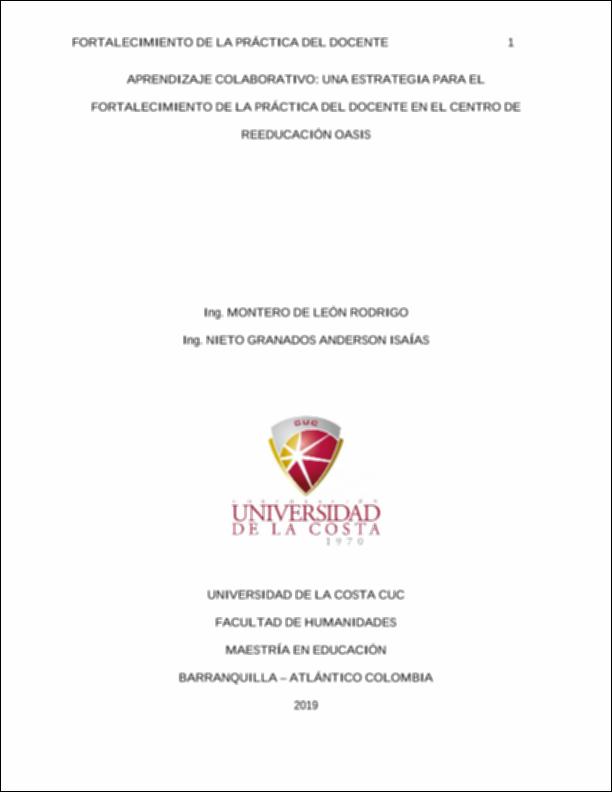Mostrar el registro sencillo del ítem
Aprendizaje colaborativo: una estrategia para el fortalecimiento de la práctica del docente en el centro de reeducación oasis
| dc.contributor.advisor | Conde Hernández, Marcial | spa |
| dc.contributor.author | Montero De León, Rodrigo | spa |
| dc.contributor.author | Nieto Granados, Anderson Isaías | spa |
| dc.date.accessioned | 2019-08-31T03:06:25Z | |
| dc.date.available | 2019-08-31T03:06:25Z | |
| dc.date.issued | 2019 | |
| dc.identifier.uri | http://hdl.handle.net/11323/5223 | spa |
| dc.description.abstract | The research in the reeducation center emerges because the teaching staff develops various techniques of collaborative learning, but these are not developed in the appropriate way. Which is necessary to conduct a thorough review of the teaching practice and make the relevant reflections, likewise, implement collaborative learning strategies in an appropriate manner, in order to transform the practice of the teacher, the main purpose to achieve. According to (UNESCO, 2014), "collaborative professional learning is part of teacher professional development as a strategy to recover teacher training processes, as activities that involve common actions." In addition, (UNESCO, 2014) states that "the central idea of collaborative professional collaborative learning is to recognize that teachers learn from their pedagogical practices: learning to learn, to seek, to select, to experiment, to innovate, in short, to teach " The epistemological dimension is research is framed in a socio-critical paradigm, with a qualitative approach and as a design the action research, which is totally collaborative in nature; indicated for the research developed in the oasis reeducation center with the teaching staff, with which it is desired to generate an installed capacity of how to execute the collaborative learning. The teacher involved in the development of the research, are essential participants in each proposed purpose, without them the action research is not functional, because the action plans are built together and this is done through practice. Meanwhile, the techniques and instruments for collecting the information used were; the interview and observation, both applied to the faculty of the oasis reeducation center. Consequently, the research yields favorable results that point to the collaborative learning strategy as the ideal to transform the teaching practice in the classroom. | spa |
| dc.description.abstract | La investigación en el centro de reeducación emerge debido a que la planta docente desarrolla diversas técnicas del aprendizaje colaborativo, pero estas no son desarrolladas de la forma apropiada. Lo cual se hace necesario realizar una revisión exhaustiva sobre la práctica docente y realizar las reflexiones pertinentes, así mismo, implementar las estrategias de aprendizaje colaborativo de forma apropiada, con la finalidad de Transformar la práctica del docente, propósito principal a alcanzar. Según (UNESCO, 2014), “el aprendizaje profesional colaborativo hace parte del desarrollo profesional docente como una estrategia para recuperar los procesos de formación docente, en tanto actividades que implican acciones comunes”. Además, (UNESCO, 2014) manifiesta que “la idea central del aprendizaje colaborativo profesional colaborativo es reconocer que los docentes aprendan de sus prácticas pedagógicas: aprender a aprender, a buscar, a seleccionar, a experimentar, a innovar, en fin, a enseñar”. La dimensión epistemológica está investigación está enmarcada en un paradigma socio-critico, con un enfoque cualitativa y como diseño la investigación-acción, la cual es totalmente de naturaleza colaborativo; indicada para la investigación desarrollada en el centro de reeducación oasis con el profesorado, con el cual se desea generar una capacidad instalada de como ejecutar el aprendizaje colaborativo. El profesora involucrado en el desarrollo de la investigación, son participantes esenciales en cada propósito propuesto, sin ellos la investigación-acción no es funcional, debido a que los planes de acciones se construyan conjuntamente y esto se realiza por medio de la práctica. Mientras tanto, la técnicas e instrumentos para la recolección de la información utilizados fueron; la entrevista y observación, ambos aplicado a la planta docente del centro de reeducación oasis. En consecuencia, la investigación arroja uno resultados favorables que apunta a la estrategia de aprendizaje colaborativa como la ideal para transformar la práctica docente en el aula. | spa |
| dc.language.iso | spa | |
| dc.publisher | Universidad de la Costa | spa |
| dc.rights | Attribution-NonCommercial-ShareAlike 4.0 International | spa |
| dc.rights.uri | http://creativecommons.org/licenses/by-nc-sa/4.0/ | spa |
| dc.subject | Aprendizaje colaborativo | spa |
| dc.subject | Práctica docente | spa |
| dc.subject | Centro de reeducación | spa |
| dc.subject | Collaborative learning | spa |
| dc.subject | Teaching practice | spa |
| dc.subject | Reeducation center | spa |
| dc.title | Aprendizaje colaborativo: una estrategia para el fortalecimiento de la práctica del docente en el centro de reeducación oasis | spa |
| dc.type | Trabajo de grado - Pregrado | spa |
| dc.rights.accessrights | info:eu-repo/semantics/openAccess | spa |
| dc.identifier.instname | Corporación Universidad de la Costa | spa |
| dc.identifier.reponame | REDICUC - Repositorio CUC | spa |
| dc.identifier.repourl | https://repositorio.cuc.edu.co/ | spa |
| dc.publisher.program | Maestría en Educación | spa |
| dc.type.coar | http://purl.org/coar/resource_type/c_7a1f | spa |
| dc.type.content | Text | spa |
| dc.type.driver | info:eu-repo/semantics/bachelorThesis | spa |
| dc.type.redcol | http://purl.org/redcol/resource_type/TP | spa |
| dc.type.version | info:eu-repo/semantics/acceptedVersion | spa |
| dc.type.coarversion | http://purl.org/coar/version/c_ab4af688f83e57aa | spa |
| dc.rights.coar | http://purl.org/coar/access_right/c_abf2 | spa |
Ficheros en el ítem
Este ítem aparece en la(s) siguiente(s) colección(ones)
-
Posgrado [1208]


